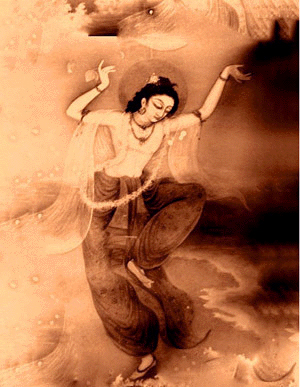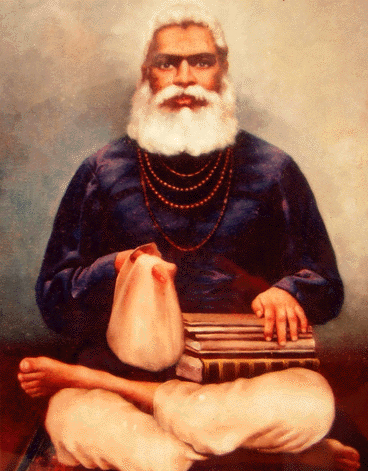Sri Sanmodana Bhasyam, Part 14
BY: SUN STAFF
Jun 08, 2016 — CANADA (SUN) — A commentary on Lord Caitanya’s ‘Siksastakam’ by HDG Srila Bhaktivinoda Thakur, with a Bengali song for each verse that expands upon Mahaprabhu’s devotional moods (Sanskrit, 1886).
nayanam – the eyes; galat-asru-dharaya – by streams of tears running down; vadanam – mouth; gadgada – faltering; russhaya – choked up; gira – with words; pulakaih – with erection of the hairs due to transcendental happiness; nicitam – covered; vapuh – the body; kada – when; tava – Your; nama-grahane – in chanting the name; bhavisyati – will be.
“My dear Lord, when will My eyes be beautified by filling with tears that constantly glide down as I chant Your holy name? When will My voice falter and all the hairs on My body stand erect in transcendental happiness as chant Your holy name?”
Sri Sanmodana Bhasyam
In the five previous slokas, the following topics have been explained: sraddha, sadhusangha, bhajanakriya, anarthanivritti, nistha, ruci, asakti and bhava.
From the progression of the subject matter so far, we are learning how the jiva, with the assistance of pure bhakti which is the essence of the Lord’s hladinisakti, gradually attains his svarupa.
In this verse, the theme of bhavabhakti is being further elaborated upon. When the stage of bhavabhakti is attained, pure devotional service is perfected to the point of becoming continuous and unbroken. Bhava is synonymous with the word rati (spontaneous attraction); bhavabhakti is the bud that soon flowers into the full bloom of premabhakti, loving devotion.
Out of the nine limbs of devotional services that are initiated in sadhanabhakti, it is the chanting of Krsna’s name alone that becomes very intensified in bhavabhakti.
The sadhaka in bhavabhakti is marked by nine symptoms: 1) he is anxious to utilize his time in Krsna’s service and does not like to be idle; 2) he is always reserved and perseverant; 3) he is always detached from all material attraction; 4) he does not long for any material respect in return for his service; 5) he is certain of Lord Krsna’s mercy; 6) he is always very eager to serve the Lord faithfully; 7) he is very attached to the chanting of the holy names of the Lord; 8) he is always eager to describe the transcendental qualities of the Lord; 9) he is very pleased to live in a place where the Lord’s pastimes are performed, such as Mathura, Vrndavana or Dwaraka. These symptoms become visible in a devotee when he is on the threshold of entering into full bhava.
…ruci or the intense desire to attain the Lord’s lotus feet, which softens and melts the heart, such sadhanabhakti is then known as bhavabhakti. That bhava consists of the rays of the sun of prema and the rays of the sun of Krsna’s matchless transcendental beauty.
Therefore it is concluded that bhavabhakti or rati is the dawning of prema. Prema in its the very initial stage can be called bhava; and in this stage the eight ecstatic symptoms (asta-sattvika vikara) like crying, horripilating, etc. begin to slightly manifest. When meditating on the Lord’s lotus feet, the heart melts and profuse tears stream out spontaneously. Descriptions of such ecstacies are found in the Vaisnava tantrasastras and the Puranas, which confirm that the ecstatic symptoms that are manifest in prema with full intensity make a shy but firm appearance in the stage known as bhava.
The scriptures list many bodily symptoms of bhava under the heading anubhava, which include dancing, rolling in the dust, singing loudly, stretching the body, making loud outbursts, yawning, breathing heavily, ignoring outsiders, drooling, laughing like a madman, wheeling the head and belching.
As mentioned, there are eight major ecstatic symptoms called asta-sattvika vikara; these are paralysis, perspiration, horripilation, pallor, choked voice, trembling, weeping and swooning. Of these, dancing, singing, crying, horripilating, and choked voice are particularly prominent in the stage of bhava. In this sloka, we find the supreme teacher Sri Krsna Caitanya has taken these symptoms into special account. He prays, “O Krsna! O Son of Maharaja Nanda! When will My eyes be decorated with tears of love when I chant Your Name? When will My voice choke up with ecstatic emotions? When will My body be filled with horripilations? O Lord! Be merciful that these ecstatic symptoms may soon decorate My body at the time of chanting Your Name!”
Sri Caitanya Caritamrita Antya 20.37:
“Without love of Godhead, My life is useless. Therefore I pray that You accept Me as Your servant and give Me the salary of ecstatic love of God.”
“O Lord Krsna, enjoyer of the gopis, when will the eyes of this gopi brim over with cascading tears at the recitation of Your Name? When will my voice choke up with love and my body tingle with horripilation?”
This is a perfect example of a prayer of love for Krsna. In the context of this verse another verse from Bhakti-rasamrita- sindhu may be cited for consideration: “O Lord Pundarikaksa, while chanting Your holy name with tears in my eyes, when shall I dance in ecstasy on the bank of Yamuna?” (BRS 1.2.156)
In chanting the secondary names of Krsna (gauna-nama), there is no question of experiencing prema. Therefore Lord Caitanya has said, “Although the teachings of the Upanisads may be heard, they are far removed from the nectarean pastimes of Krsna, and therefore they are unable to melt the heart and make the hearer erupt into ecstatic tears and horripilation.”
The subject of the Upanisads is Brahman; but that is only remotely connected with the sweetness of the narration of Krsna’s pastimes, which always produces ecstasy in the hearts of pure devotees.
This sloka does not refer to those who have naturally moist eyes or who display artificial bhava; when the jiva becomes pure and spontaneously attracted to devotional service to Krsna, his body and very life force become completely obedient to the eternal bhavas that constantly play within the heart. Therefore, the melting of the heart, the ecstatic symptoms that grip the body and life force are experienced only to those unalloyed devotees who are absolutely cleansed of all anarthas.
Those neophyte souls who try to artificially imitate the ecstatic emotions and symptoms of the mahabhagavata devotees so as to deceive the general populace are in fact creating a gigantic hurdle on their path of advancement in Krsna consciousness.
Srimad Bhagavatam 11.3.30-31:
“One should learn how to associate with the devotees of the Lord by gathering with them to chant the glories of the Lord. This process is most purifying. As devotees thus develop their loving friendship, they feel mutual happiness and satisfaction. And by thus encouraging one another they are able to give up material sense gratification, which is the cause of all suffering.
The devotees of the Lord constantly discuss the glories of the Personality of Godhead among themselves. Thus they constantly remember the Lord and remind one another of His qualities and pastimes. In this way, by their devotion to the principles of bhakti-yoga, the devotees please the Personality of Godhead, who takes away from them everything inauspicious. Being purified of all impediments. the devotees awaken to pure love of Godhead, and thus, even within this world, their spiritualized bodies exhibit symptoms of transcendental ecstasy, such as standing of the bodily hairs on end.”
Srimad Bhagavatam 11.3.32:
“Having achieved love of Godhead, the devotees sometimes cry out loud, absorbed in thought of the infallible Lord. Sometimes they laugh, feel great pleasure, speak out loud to the Lord, dance or sing. Such devotees, having transcended material conditional life, sometimes imitate the unborn Supreme by acting out His pastimes. And sometimes, achieving His personal audience, they remain peaceful and silent.”
#Sri Sanmodana Bhasyam




